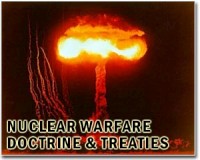 |
Washington (AFP) May 1, 2010 US officials are in talks with Egypt over a plan to make the Middle East a nuclear-free zone, part of an effort to block the Iranian nuclear program, The Wall Street Journal reported Saturday. Citing unnamed US officials, the newspaper said the White House wanted to build on a non-binding agreement that emerged from a 1995 UN review of the Non-Proliferation Treaty (NPT). That agreement had designated the region as a zone free of weapons of mass destruction: the aim now was to promote a Middle East nuclear weapons-free zone, which would include Israel, the Arab states, Iran and Turkey. The US administration was also seeking a conference on the subject. US officials said talks with Egypt would resume in New York in the coming month during the month-long nuclear Non-Proliferation Treaty (NPT) review conference, the paper said. "We've made a proposal to them that goes beyond what the US has been willing to do before," the Journal quotes one senior US official as saying. However, US officials stressed that they didn't believe progress in the nuclear-free zone talks would happen without first achieving major advances in Arab-Israeli peace talks, the paper noted. The United States had also discussed the proposal with the Arab League and other members of the Non-Aligned Movement, the paper reported, quoting Ellen Tauscher, undersecretary of state for arms control and international security. But this latest initiative could raise new tensions between President Barack Obama and Israeli Prime Minister Benjamin Netanyahu, The Journal said. Israel has never publicly acknowledged having nuclear weapons, maintaining a policy of deliberate ambiguity since it inaugurated its Dimona nuclear reactor in 1965. It is not a party to the NPT, which requires international inspections. A new nuclear Non-Proliferation Treaty review summit opens Monday at UN headquarters in New York. Iranian President Mahmoud Ahmadinejad is expected to participate. The summit comes as the United States and its partners seek to craft a new UN resolution imposing a fresh round of sanctions against Tehran over its nuclear program. On Tuesday, Egypt's UN Ambassador Maged Abdel Aziz said that establishing a Middle East nuclear-free zone at the nuclear Non-Proliferation Treaty (NPT) review conference was the key to resolving the nuclear standoff with Iran. Iran denies the charges that its civilian nuclear program hides a covert quest for an atomic arsenal, but has refused to freeze uranium enrichment, which can be a key step towards developing a nuclear weapon.
Share This Article With Planet Earth
Related Links Learn about nuclear weapons doctrine and defense at SpaceWar.com Learn about missile defense at SpaceWar.com All about missiles at SpaceWar.com Learn about the Superpowers of the 21st Century at SpaceWar.com
 UN to scrutinize efforts to check nuclear proliferation
UN to scrutinize efforts to check nuclear proliferationUnited Nations (AFP) May 2, 2010 Some 150 countries meet here from Monday to review global efforts to check the spread of nuclear weapons, with the unresolved Iranian nuclear crisis looming large in the background. Iranian President Mahmoud Ahmadinejad, whose country is likely to face fresh UN sanctions over its nuclear defiance, was expected to be among the first to speak at the opening session of the Nuclear Non-Prolifera ... read more |
|
| The content herein, unless otherwise known to be public domain, are Copyright 1995-2010 - SpaceDaily. AFP and UPI Wire Stories are copyright Agence France-Presse and United Press International. ESA Portal Reports are copyright European Space Agency. All NASA sourced material is public domain. Additional copyrights may apply in whole or part to other bona fide parties. Advertising does not imply endorsement,agreement or approval of any opinions, statements or information provided by SpaceDaily on any Web page published or hosted by SpaceDaily. Privacy Statement |